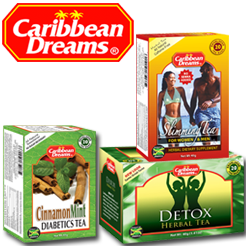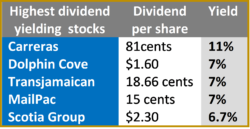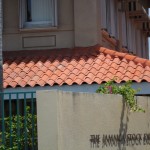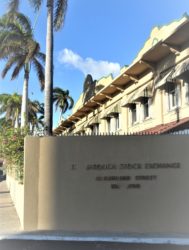Republic Bank of Trinidad & Tobago (RBTT) acquired 8.79 percent of HFC Bank Ghana Limited in 2012 moving them into the fourth largest shareholder spot. Earlier this year, they increased to 32.02 percent making them the largest shareholder, above the Social Security & National Insurance Trust that held 77,588,794 shares or 26.18 percent.
The holding triggered the mandatory takeover requirement and resulted in an application to the Securities and Exchange Commission in Ghana for a waiver of the Code on Take Overs and Mergers. Republic Bank was informed by letter dated 24th June, 2013, that the Commission has denied its application for a waiver and has been advised to comply with the mandatory takeover requirement and make an offer for 42.98 percent of the shareholding in HFC Bank Ghana Limited.
A release from the Trinidadian bank states “Republic Bank is currently engaged in discussions with the Securities and Exchange Commission in Ghana and the Bank of Ghana regarding the next steps. Republic Bank looks forward to deepening its relationship with HFC Bank Ghana Limited and is committed to working with its management and staff to add value to its operations.”
 Shares of HFC Bank Ghana Ltd (HFC) began the fourth quarter (Q4) of 2012 at a share price of GH¢0.45 (around J$23). The share price remained steady at GH¢0.45 to the end of December 2012, closing the quarter at its opening price. Thus, with a year-open price of GH¢0.45, the year 2012 closed with HFC shares registering no gain or loss on the share price. The price is now up to GH¢0.55 as of last Friday’s trading on the Ghana Stock Exchange.
Shares of HFC Bank Ghana Ltd (HFC) began the fourth quarter (Q4) of 2012 at a share price of GH¢0.45 (around J$23). The share price remained steady at GH¢0.45 to the end of December 2012, closing the quarter at its opening price. Thus, with a year-open price of GH¢0.45, the year 2012 closed with HFC shares registering no gain or loss on the share price. The price is now up to GH¢0.55 as of last Friday’s trading on the Ghana Stock Exchange.
HFC closed the year 2012 trading at a forward (annualised) Price-Earnings (P/E) multiple of 10.9 times, which was above the average of its peers which stood at 7.8 times as at December 31, 2012 and a Price-Book Value of 1.04 times. HFC Bank also paid interim dividends for the 2012 financial year and currently has a dividend yield of 5 percent, which compares favourably with its industry peers averaging at a dividend yield of 5.7 percent.
The fourth quarter of 2012 also saw the bank increase its stated capital by GH¢50 million through its private placement which was fully subscribed to. Consequently, the company issued additional shares of 112.42 million, and in addition to executive share options that were exercised in December 2012, the total issued shares for HFC bank stood at 296.36 million shares and a market capitalisation of GH¢133.36 million as at December 31, 2012.
In the year 2012 under review, the Group posted Net Interest Income of GH¢45.46 million up from GH¢39.74million, while profit after tax was GH¢15.42 million in 2012, up by 42.10 percent.
The Ghanaian bank is just the about a third the size of Sagicor Investments, with total assets of GH¢ 594.90 million, an increase of 36.74 percent and customer deposits increased by 35.6 percent to GH¢312.38 million up from last year’s figure of GH¢230.30 million.
Management’s Outlook | “The Bank is positioning itself to be a leading retail and SME focused financial institution in the country. We are therefore providing our staff with training and orientation to efficiently service the financial needs of the large SME market in Ghana. The Bank will also participate in financing of the oil and gas industry, infrastructural and residential real estate projects. Cocoa remains a major contributor to Ghana’s GDP, we will therefore strengthen our presence in the Country to respond to the needs of the industry.
The equity injection and the participation of strategic investors has among others, competitively repositioned the bank in the banking industry to take advantage of enormous opportunities within Ghana. HFC is poised to grow all aspects of its Universal Banking business to deliver value to its shareholders in the year 2013 and beyond. It is expected that these will impact positively on its share price performance. It is recommended that investors hold HFC shares to benefit fully.”
Ghana’s Economy | Ghana’s population is put at 25 million with a GDP per capita on a purchasing power parity basis is US$3,200, in comparison Jamaica’s is US$9,100 with a population of 2.7 million. The bank has a lot of room to grow based on size and the fact that the economy has been on a good growth path.
|
Country |
1999 |
2000 |
2001 |
2002 |
2003 |
2004 |
2005 |
2006 |
2007 |
2008 |
2009 |
2010 |
2011 |
| Ghana |
4.3 |
3 |
3 |
5.8 |
4.7 |
5.4 |
5.9 |
6 |
5.5 |
7.3 |
4.1 |
5.7 |
13.6 |
The Bank of Ghana Composite Index of Economic Activity (CIEA) grew by 6.8 percent in December 2012 compared to 14.9 percent growth in 2011. A provisional estimate of the real GDP growth, according to the Ghana Statistical Service (GSS), was 7.1 percent in 2012.
Inflationary pressures were subdued in 2012 as depicted by trends in consumer prices ending at 8.8 percent in December 2012. The Policy Rate was raised by 250 basis points to 15 percent in June and maintained for the rest of the year, but the benchmark 91-day Treasury Bill rate rose from 10.7 percent in December 2011 to 22.4 percent in December 2012. The average 3 month deposit rate went up to 12.5 percent in December 2012 from 7.8 percent in December 2011, while average lending rates declined marginally from 25.9 percent to 25.7 percent in the same period.
 Tax revenue amounted to GH¢11.6 billion, about 3.7 percent lower than the budget target of GH¢12.1 billion, mainly on account of lower company taxes, especially from oil companies. Total expenditure was 14.7 percent higher than the budget target in 2012. The resulting developments in the fiscal operations resulted in a deficit of GH¢8.7 billion (12.1 percent of GDP) against 6.7 percent targeted.
Tax revenue amounted to GH¢11.6 billion, about 3.7 percent lower than the budget target of GH¢12.1 billion, mainly on account of lower company taxes, especially from oil companies. Total expenditure was 14.7 percent higher than the budget target in 2012. The resulting developments in the fiscal operations resulted in a deficit of GH¢8.7 billion (12.1 percent of GDP) against 6.7 percent targeted.
The stock of total public debt stood at GH¢33.5 billion (46.7 percent of GDP) in 2012, compared with GH¢24.0 billion (42.6 percent of GDP) in 2011 with external debt amounting to US$8.0 billion, compared with US$7.8 billion during the corresponding periods. The overall balance of payments surplus of US$546.5 million in 2011 was reversed, recording a deficit of US$1.2 billion in 2012. Gross International Reserves (GIR) at the end of 2012 was US$5.4 billion (3 months import cover) compared to US$5.5 billion in 2011. Private inward transfers through the Banks amounted to US$18.7 billion in 2012, representing a 4.9 percent growth over 2011. During the second half of 2012, stability was restored in the foreign exchange market, following a heightened volatility in the first half of the year, with the cedi experiencing a year-to-date depreciation of 17.5 percent as at December 2012 compared with 5 percent depreciation in 2011.
Major industries | Ghana is involved mainly in mining, lumbering, light manufacturing, aluminum smelting, cocoa and other food processing and shipbuilding. The major exports are gold and other minerals, cocoa, timber, and tuna. Imports include capital equipment, petroleum, and foodstuffs. The Netherlands, Nigeria, Great Britain, the United States, and China are Ghana’s major trade partners.
Insider call | Republic Bank is an IC Insider Buy Rated stock.







[…] ordinary shares at a price of GHS 0.67 (USD 0.31) per share. This is the second such increase in Republic’s holdings in the Ghanaian Bank. The matter of Republic making a mandatory offer to all shareholder to acquire […]